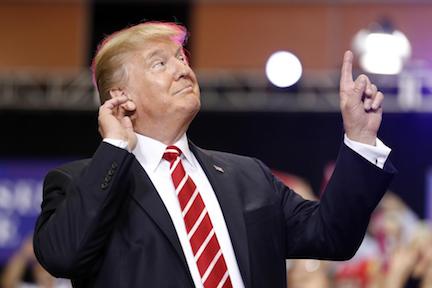President Donald Trump is poised to delay a decision by up to six months to impose auto tariffs to avoid blowing up negotiations with the EU and Japan and further antagonize allies as he ramps up his trade war with China, according to people close to the discussions.
Trump faces a May 18 deadline over how to proceed with his threat to slap a tariff of as much as 25% on imported cars and parts in the name of U.S. national security.

Trump, who is due to make a state visit to Japan later this month, remains the wild card, according to people close to the discussion. Trump and a small group of aides including Commerce Secretary Wilbur Ross and trade adviser Peter Navarro are seen to be in favor of the new import duties against the advice of other advisers.
Tariff Delay
But people close to the discussions say even advocates of tariffs are still debating the scope of any action, complicating the discussions. Other advisers including U.S. Trade Representative Robert Lighthizer, who is leading the negotiations with the EU and Japan, have been urging Trump to postpone a decision, according to administration officials and other people familiar with the deliberations.
At a White House meeting on Tuesday officials firmed up the decision to delay tariffs for up to 180 days, according to two people familiar with the deliberations. A decision is expected to be announced publicly before the end of the week.
Spokespeople for Ross and Lighthizer did not immediately respond to a request for comment, and the White House declined to comment.
Trump last year ordered a Commerce Department investigation into whether imported cars and parts posed a threat to U.S. national security and he was presented with a final report laying out a series of recommendations in February. The findings weren’t publicly released.
According to people who have seen the report, the justification for auto tariffs is not that the imports of vehicles and auto parts per se are a threat to national security, but it’s the portion they contribute to the overall U.S. trade deficit that could cause harm.
“The reason autos are very important to our trade picture is about half of our trade deficit comes from the single product, automotive, and about the other half of our trade deficit comes from a geographic area and that’s called China,” Ross said on Friday.
In closed-door meetings with foreign countries and auto representatives, officials from the U.S. Trade Representative’s office and Commerce have indicated for several weeks that the president will delay his decision and the duties will not derail ongoing trade negotiations.
Trump advisers have cautioned the president that action on auto tariffs could risk serious pushback from Congress. Trump’s own party is threatening to move forward with legislation to limit the president’s tariff authority with many in Congress saying duties on cars, which are widely opposed by the auto industry, would be a step too far.
USMCA Agreement
Trump’s advisers for months have been debating a strategy to delay the deadline and make the case that imposing broad auto tariffs would derail not only trade talks with Japan and the EU but also passage of the new U.S. Mexico Canada Agreement through Congress.
Auto industry representatives have been working closely with USTR and the White House to publicly tout the benefits of USMCA and supported a White House study last month that laid out the expected job increases if the deal gets approved by Congress and fully implemented.
After the Trump administration faced massive resistance from auto companies during the negotiations for the new Nafta, they are now among the biggest proponents of the deal.
The U.S. imported $191.7 billion in passenger vehicles and light trucks in 2018 with more than $90 billion of those imports coming from Canada and Mexico, which are duty-free under Nafta. Passenger cars are now subject to a 2.5% U.S. tariff but Trump has threatened to raise that to 25%, arguing that the EU and other countries have higher barriers to U.S. auto exports.
Any new tariffs would hit imported cars from Japan, South Korea and Europe hardest. But they would also hit the supply chains of many domestic producers who rely on imported parts and foreign automakers with manufacturing operations in the U.S.
Tariffs on European cars imported into the U.S. would disproportionately hurt Volkswagen AG’s Porsche and Audi brands, as Porsche imports all of its U.S.-sold cars from Europe, while Audi imports more than two thirds, according to data compiled by Bloomberg Intelligence.
Mercedes-parent Daimler AG would also be affected, as 64% of its U.S.-sold cars come from Europe. BMW AG would be slightly better off, with more than half of its U.S. cars being made locally.
The National Automobile Dealers Association estimates that the tariffs would add as much as $2,270 to the cost of U.S.-built cars and $6,875 to the cost of imported cars and trucks.
“We are deeply concerned that the administration continues to consider imposing auto tariffs,” the Alliance of Automobile Manufacturers, a trade group representing the largest domestic and foreign car makers with operations in the U.S., said in a statement. “At the end of the day, you can have tariffs or investment, but you can’t have both.”










